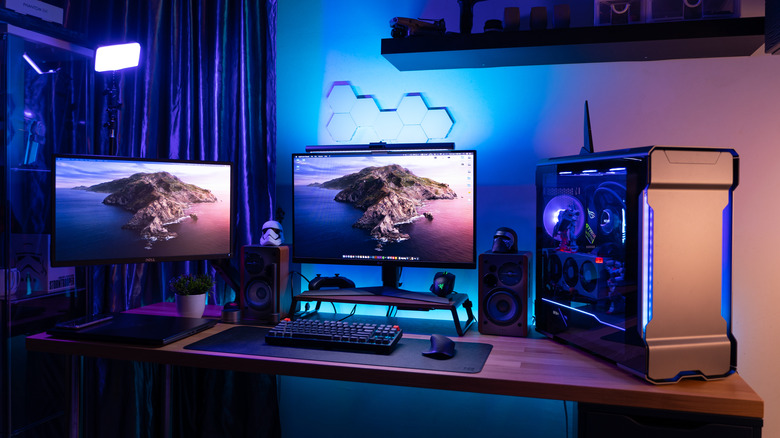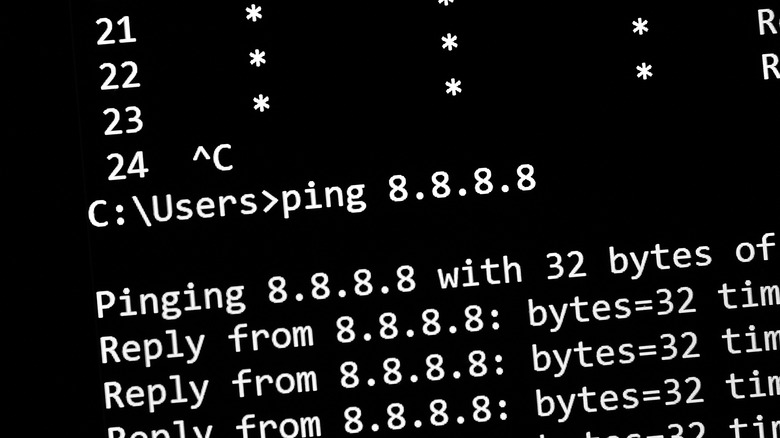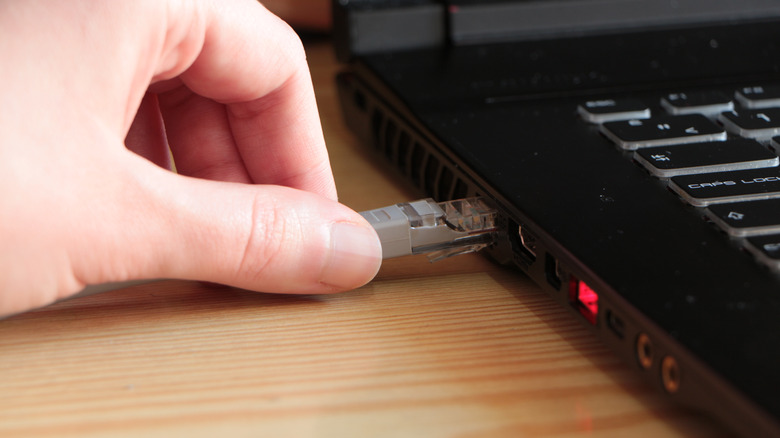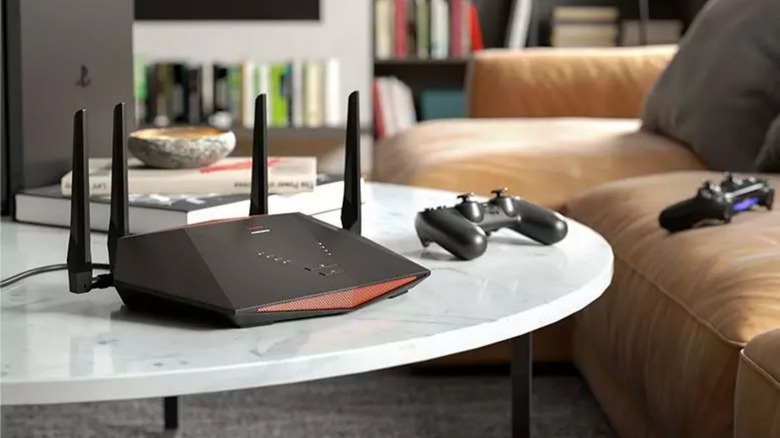8 Best Ways To Reduce Latency In Online Gaming
There's absolutely nothing worse than being in the middle of a game with your friends when your internet connection drops or starts getting spotty. Playing games that require the internet means that you have to rely on the connection between your computer and your router in order to have a smooth gaming experience. While it'd be awesome if online gaming experiences were buttery smooth and glitch-free 100% of the time, that's often not the case.
If you frequently play online games, you might be familiar with the terms "ping," "lag," and "latency." Understanding what these terms mean is crucial to figuring out what the weak link is in your setup, and how to fix it so you can play online games in peace.
Whether your internet completely disconnects during an online game or simply gets slow and laggy, both situations are annoying because they hinder your ability to play an online game well. Luckily, both situations can be fixed through a series of troubleshooting steps.
Let's define stuff: Ping, lag, and latency
If you're already familiar with the terms "ping," "lag," and "latency," you can skip ahead. But if you've never heard of these words before or you just want to test your knowledge, here's a refresher.
When you hear the word "ping," you might immediately think of a high-pitched sound, like the sound a spoon makes when it hits the side of a glass. In regards to gaming, however, ping refers to the time it takes (in milliseconds, or ms) for a signal to travel between an action within an online game and the server you're playing on. That said, you can combine the two definitions to make it easier to understand how ping works.
Imagine that your hand moving the spoon is like the action you're taking in an online game, like walking forward, and the glass is like the server that's responding to your in-game action. The faster that you're able to clink the glass with your spoon, the better; in-game, a faster ping rate means that when you give the command to move your player forward, the server responds quicker. A slow ping rate often makes games unplayable.
While ping is a one-way measurement of how fast it takes for a signal to be sent from your computer to a server, latency is a measurement of the whole trip to and from the server back to your computer. Ping is used to measure latency.
Lastly, lag is the result of a high ping or high latency situation. When these two measurements are two high, they make your gameplay slow, sometimes so slow to the point that you can't even play the game anymore. Experiencing lag in a game could look like a stuttering screen or a completely frozen screen.
What causes high latency?
If you're using your home internet to listen to music, stream a video on your phone, or write a school paper, you likely won't experience high latency, or you at least won't notice it. Typically, you'll only notice high latency issues if you're trying to play a game or chat with someone over a video call. That's because these activities require a more direct and constant connection to your internet than simply checking your email or listening to a song on repeat.
High latency can be caused by a number of things, so you'll have to do some troubleshooting to figure out the root cause. On a broad level, however, high latency can be caused by a bad internet connection, a poor router, the distance between you and your router or you and the server you're trying to connect to, or something on the computer you're trying to play a game on.
Luckily, no matter what the cause of your high latency is, you can figure it out. There are multiple different avenues to check, but you should start off by inspecting your router to make sure everything's okay with your connection.
Check your router
One of the most common culprits of high latency while online gaming is your router. Especially if you're playing a demanding online game in a household where other people are using the internet at the same time, your router just sometimes can't handle it. If you end up needing to replace your router with one that can handle the demands of your online games or your household's overall internet usage, we've got you covered with some recommendations.
Sometimes, however, your router might just need a firmware upgrade. Or, many routers nowadays have dual bands, one that's 2.4GHz and one that's 5GHz; you could connect to the 5GHz band while the rest of your household connects to the other band to try to offer some relief. But how do you check out your router?
Usually, a router will have a companion app, whether it's a standalone router you purchased or it's the router that came from your internet service provider. Once you find the app and either log in or set up your account, you can take a look at your router. All apps are different, so there's no way of knowing exactly where you should look for a firmware upgrade, but it would most likely be in the settings section.
Having an app to check on your router from your phone is a good idea even after you solve your high latency problem. You can often kick unwanted guests off your network, see which devices are connected to which band of a multi-band router and troubleshoot directly from the app.
Make sure your Wi-Fi connection is reliable
If you've checked that your router doesn't need a firmware upgrade and all wires are properly connected and unfrayed, the next step is to ensure your Wi-Fi connection is reliable.
The easiest way to check your Wi-Fi signal strength is to look at the connection symbol on the device you're gaming on. Most Wi-Fi connection indicators have four or five curved lines; the more lines that are filled, the stronger your connection. If you notice that only one or two lines are filled in on your Wi-Fi connection indicator or see a globe icon indicating no network connection, that's definitely where part of your problem is.
Poor Wi-Fi connection can sometimes be due to your distance from the router or, if there are walls separating your computer from the router, how thick the walls are in your home. Before you buy a new router, try restarting your modem, router, and computer and testing the Wi-Fi strength again. If it's still poor, it's time to move on to other ways of fixing your high latency problem.
Shut down programs or websites in the background
This tip may seem like a no-brainer, but a lot of people forget that having anything else besides your game open on your computer can make a significant impact on latency. If your computer is trying to send out multiple commands at once, it may not know which programs to give priority to. By closing everything else besides your game, you're helping your computer realize that your online game is its sole priority.
This includes any open tabs in a browser like Google Chrome as well as external programs like Microsoft Office products, McAfee Antivirus, or Slack. Of course, you might want certain programs open that pertain to your game, like Discord; just make sure you close out any unnecessary programs.
Sometimes, you might not even realize that certain programs are running in the background while you're gaming. Many antivirus software and other programs open when you turn your computer on and run in the background, even if you don't currently have them open and in use. You can check which programs are running at a particular moment through your Task Manager, which you can access by pressing the keys Ctrl + Alt + Delete.
Inspect your internet speed
Although they can seem like they're synonymous, your Wi-Fi signal strength and your internet speed are two separate things. You could have a really strong internet connection because you're hooked up directly to your router via an Ethernet cable, but have slow internet speeds because of the plan you have with your internet service provider, or ISP.
So how do you test your internet speed? Well, there are quite a few speed test sites out there, but the most highly regarded one is simply titled Speedtest. All you have to do is go to the website and press the Go button on the home screen. The site should automatically detect your internet based on the strongest nearby connection or the Wi-Fi network your computer is connected to.
The key here is to compare the speeds that show up on your speed test with the speeds you're paying for with your ISP. If your internet speed is constantly slower than what you're paying for, it's time to get in contact with your ISP to figure out what's going on.
If you can, connect to your router via an Ethernet cable
Not everyone is able to set up their computer right next to the router with a direct connection via Ethernet. That's honestly a privilege, especially if you live in an apartment. However, if it's possible to connect your computer to your router via an Ethernet cable, either by moving your computer closer or by investing in a really long cable, do it.
If online games are your thing and you constantly struggle with high latency, creating a direct connection between your computer and your router is going to give you the best results. Doing this eliminates the need for your computer to wirelessly communicate with your router, thus decreasing latency.
You could also try out a mesh router or a Wi-Fi extender if using an Ethernet cable isn't an option for you. Either of these options will boost the Wi-Fi signal near your computer and hopefully reduce latency.
Consider switching internet providers or upgrading your plan
Switching ISPs, or internet service providers, isn't a pleasant task, but sometimes it has to be done. If you've done a speed test and your ISP isn't delivering the speed you're paying for, that's a dealbreaker. You should find a new ISP as soon as possible.
Sometimes, ISPs will have a stronger presence in a specific area or city. This could be due to demand and competition, or because one ISP has been able to install fiber optic cables and offer incredibly fast Fiber Internet plans to its customers.
If you like your ISP or they're the only option in your area, take a look at the other plans they have available. For someone playing online games, a higher internet speed is worth paying for. And as gross as it sounds, you can sometimes get a better deal if you call someone on the phone rather than just switch your plan online.
Avoid using VPNs or shared servers
There are many perks to using a VPN, or Verified Private Network, like viewing Netflix from a different location to get access to different content or, most importantly, increased security and privacy. For gaming, though, VPNs aren't really that awesome, especially if the games you're playing are internet-based.
VPNs don't typically provide the same bandwidth speeds that your traditional internet connection does, which translates to increased latency and an annoyed gamer. Since a VPN also connects you to a different server that's potentially further from you, increased ping and latency are common.
If you know that your ISP is throttling your gaming connection, but not paying as much attention to VPNs, this is pretty much the only situation where using a VPN during online games could help you out and result in speedier gameplay. In most situations, however, you'll be better off staying away from VPNs and shared networks while gaming online.
Upgrade your router to one better-suited for gaming
If you've tried everything else on this list and your game still looks like a gross, laggy mess every time you try to play, it might be time to upgrade your router. Many people just use the router that their internet service provider offers when they sign up for an internet plan. Usually, these routers are a two-in-one modem/router situation and definitely not the best for online gaming.
There are actually routers specifically made with gaming in mind. These routers, like Razer's Sila router, often have more bands, faster speeds, and a broader coverage area via a mesh network. Having a router with multiple bands is awesome if there are multiple people in your household who are using the internet at the same time, especially if people are playing games at the same time.
If you do a quick search for the best gaming routers, you'll get an extensive look at which ones are most popular right now. Just know that almost any router will likely be better than your ISPs proprietary router.










